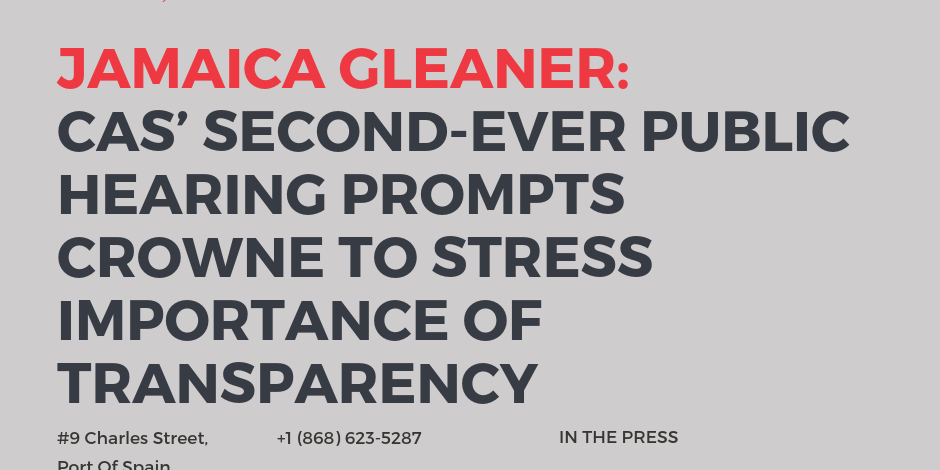The following article was first published in the Jamaica Gleaner on Friday 23rd August, 2019.
You can read the entire article on their website HERE.
Sports attorney Dr Emir Crowne has once again stressed the importance of transparency regarding closed hearings of athletes. This is in light of the Court of Arbitration for Sport’s (CAS) decision to stage its second-ever open hearing case, a move that has left him feeling vindicated in his opinion regarding the Jamaica Anti-Doping Commission (JADCO’s) decision last year to move its future hearings behind closed doors.
After JADCO announced its decision in July 2018, Crowne told The Gleaner he believed that the body to be making a backward step as he believed Jamaica being one of the few jurisdictions in the world to host athlete hearings publicly put it “ahead of its time”.
Just over a year later, China’s multiple world and Olympic swimming champion Sun Yang will publicly face CAS regarding an anti-doping violation. This is after the World Anti-Doping Agency (WADA) made an appeal to CAS against a decision by aquatics’ world governing body, FINA, to clear Sun of wrongdoing during a random drug test last September.
CAS said in a statement that the hearing, which had been tentatively set for September but will not be held before the end of October, likely to take place in Switzerland.
Sun had asked CAS to make the meeting open “in order to be fully transparent and to clear his name,” which supports Crowne’s opinion last year that transparency is the biggest positive from such a move.
“By any understanding of the open-courts principle, a closed hearing does a disservice to athletes,” Crowne told The Gleaner yesterday. “Part of the way it does a disservice to athletes is that athletes need to be reassured that the process is properly scrutinised. Proper scrutiny comes from an open hearing. JADCO is scrutinised, JADCO’s witnesses are scrutinised, the athlete is also scrutinised, as is the panel, and the process that the athlete is put through to arrive at whatever sanction or to be exonerated of a sanction.
“It is that public-scrutiny function that is extremely important in ensuring that athletes get a fair hearing, especially when it comes to doping allegations. The WADA code, everyone will admit, is a very one-sided document that places strict liability on the athletes. It is an uphill and unenviable battle that any athlete faces when it comes to a doping allegation.
“Every sports hearing, in particular doping hearings, should be open hearings, and they should invite public scrutiny into the process. That’s the only way an athlete has any chance of some sort of fairness in a doping regime that’s entirely slanted against them.”
Crowne said he was subjected to heavy and harsh criticism for his comments last year.
“When I took that stance that sports hearings should, in fact, be open, I was openly attacked for not understanding sports arbitration systems, and I was attacked for not recognising that these hearings reveal confidential information about the athletes,” he said. “But ever since, the European Court of Human Rights agreed with me that a fair hearing can only take place if it is in fact an open hearing. Now, all of a sudden, the sports community has had to do an about-face, and I will say that it is quite unfortunate that people have had to wait for a European court to, essentially, pronounce on a principle, which is an open-courts principle, which is at the heart of Jamaican and the Caribbean’s legal systems.”
But JADCO chairman Alexander Williams remains resolute on the body’s decision.
“It was always the position of CAS that upon application by anybody coming before them, that they would go public,” Williams said. “The default position is that these arbitration hearings are private. It’s just that sometimes, they may decide, either on application by the party or because the matter is of some particular importance, to deal with the matter in public. So it is the same position that JADCO is taking. The default position is that things would be done in private, but it is always open to a disciplinary panel to do the hearing in public.”
CAS’ first public hearing was also regarding aquatics, with a matter between Irish swimmer Michelle Smith de Bruin and FINA in 1999.






